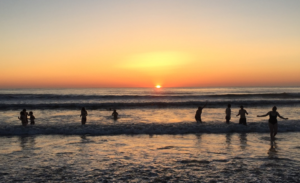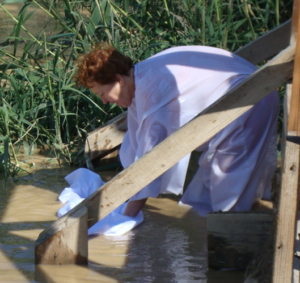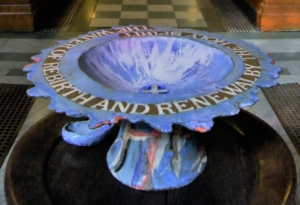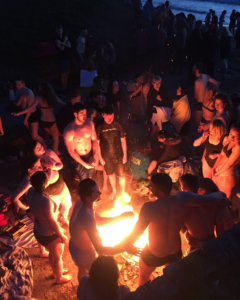‘May Dip – the After Party’
Greetings,
on a Rest Day for the University, which ordinarily would see thousands of students taking part in the May Dip. But not this year, a huge pity for so many. Nevertheless, I thought I’d greet the morning with recollections of four years ago to the day, Sunday 1 May 2016, and with the sermon I gave that day in St Salvator’s Chapel, slightly edited.
May Dip: The After Party
Readings: 2 Kings 5:1-14; Titus 3:4-7

Why did thousands of students run into the North Sea at sunrise this morning?
One reason is that it’s a revival of pre-Christian religion. At Beltane at the beginning of May, our pagan forebears would visit holy wells, walking round them sunwise from east to west, praying for health, and believing the first water drawn that day was potent for healing and fertility. Pagans today may still do so. The May Dip is not the only modern version. In Edinburgh those who wash in the morning dew on Arthur’s Seat on this day believe they will have lifelong beauty. And students in Oxford used to try to jump off the Magdalen Bridge into the two-feet deep River Cherwell, unsurprisingly often resulting in injury.
Water has a deep significance in biblical religion too, and in the Christian faith. In the story of Naaman which we heard earlier, this Aramean army commander has a serious illness. He hears of a miracle-working prophet in Israel called Elisha and goes to see him. “Go,” says Elisha, “wash in the [River] Jordan seven times, and your flesh shall be restored, and you shall be clean.” This cleanness is not of the physical dirt of his body, but a cleanness from illness. Naaman is initially sceptical. If it’s just about the water, he knows better rivers than the Jordan. But he hasn’t understood: his healing is not a property of the water. What matters is God’s will to restore Naaman’s flesh through his prophet Elisha. The Jordan is just the particular means – and symbolically appropriate.
I encountered a similar though moving misunderstanding, when I visited the banks of the River Jordan a few years ago. In our small party that day there was a middle-aged Russian couple who changed into white gowns and went down into the river, and then submerged five further white gowns. They told me later that their priest said that they could be baptised in the Jordan in the absence of a priest which is what they had done. And the other gowns? – “Two children, three grandchildren,” they said. Clearly, when their family would be baptised back in Russia, they would do so in these Jordan-washed robes. I was deeply moved by their faith, but I also know that God’s grace does not depend on which water we use.

In the New Testament, water remains hugely important in a number of ways. Jesus walks on water, calms the storm at sea, offers water gushing up to eternal life to a woman he meets at a well, and when he dies blood and water flow from his side. But the closest parallel to May Dip is surely baptism. John the Baptist offered baptism in the River Jordan for the repentance of sins. And in St Andrews, some would have said the reason for their May Dip was to cancel out the ‘sin’ of having stood on the PH outside this Chapel, the initials of Patrick Hamilton who was burnt at the stake there for his religious views in 1528. In dipping their bodies in the sea, they believed they washed themselves of that jinx to getting a degree.
Of course, this is not a story of sin and repentance but superstition and luck. In the New Testament, baptism takes a more significant turn when Jesus himself is baptised in the Jordan. The identity of Israel, of God’s chosen people, is found uniquely and completely in him: in being baptised, Jesus represents all God’s people, subject to sin, but all the same loved by God, who reaches out, offers forgiveness, restoration and renewal. The biblical books of the early church, Acts and the letters, make it clear that the first thing someone would do upon believing in Jesus was be baptised – a sign of being washed clean of the power of sin, of self-centredness, of following Jesus, of being renewed. As St Jerome said, Christians are made, not born. And baptism is the sign of that.
I’ve grown this year to love the passage from Titus which was read earlier. A phrase from it, The water of rebirth and renewal by the Holy Spirit coils around the rim of the new baptismal font by Leonie Macmillan for this chapel, which was dedicated and used two weeks ago for the first time [ie, on 16 April 2016] for three students who were baptised.

These verses are a tightly-argued theology of baptism. By ourselves we cannot escape the power of sin. This does not mean that we all act appallingly all the time. Of course we don’t – and I am aware on a daily basis of the inspiring generosity, compassion and self-sacrifice of many students here. There is deep friendship in this town. Nevertheless there is a self-centredness in ourselves, our communities and societies, indeed in our species, which seems inescapable, to come from beyond us, and which we cannot overcome by our own efforts. We drink from plenty of wells in the effort – moral codes, political creeds, religious laws – but it is only by the mercy of God that we can be clean. It wasn’t the Jordan that healed Naaman: it was the God of Elisha. And this mercy of God, according to Paul in his letter to Titus, is found in Jesus Christ, God our Saviour – the St Salvator of this chapel.
And we are saved, the passage goes on to say, through the water of rebirth and renewal by the Holy Spirit. This refers to baptism – but again it’s not the baptism which saves us, but the deep washing, cleansing, renewing and restoring of us by God, in his love.
The true after-party of baptism, of faith, of the Christian life is wholeness, the piecing together of the broken fragments of our lives into a beautiful whole. Not merely a cancelling out of the past, but renewal in joy, love, compassion and generosity, justice and restoration. Paul even sees in the after-party of the Christian life the hope of eternal life. This rebirth and renewal, this closeness in the love of God cannot be severed. The water will never truly dry. Even death cannot block the relationship which his grace makes with us.
And here I think we have another and perhaps the deepest connection between the May Dip and the Christian life. Why did thousands of students run into the North Sea at sunrise this morning? Because they did it together. It is as part of this community that we go into the water, experience the shock of the cold, scream, momentarily go under, dash back out, huddle together by a fire, laugh at the sheer madness of it, and then pull on our clothes with numb hands. In some ways we saw on the East Sands what the community of God’s people, the church, could be. A community of participation, of equality, of a common confession to each other of our wounds, our barriers, and a common, shared delight in our reconciliation, our community and our hope. I sense on the beach a ritual of re-birth, a spirit of renewal.

I am not superstitious. And let me reassure everybody here that there is no relation in reality between standing on the PH and getting a degree. But I confess I’ve always avoided stepping on the initials – who knows what degree I might take in retirement? We all live with contradictions. And I have done the May Dip four times. [Now seven times.] But this is the first after-party I’ve gone to. An after-party in this Chapel of St Salvator, which gives space to reflect on the grace of God found in being washed in the waters, of stripping away the layers of our barriers, of being immersed in his mercy, of coming out to a community of reconciliation, of welcome and acceptance, of looking forward to relationships of commitment, and of hope that we can never be separated from this love. We may be cold, wet, numb, tired and emotional – but are not alone.
[End of sermon]
Four years on, our next University service is this coming Sunday 3 March, not, sadly, in St Salvator’s Chapel, but brought together by Zoom. St Salvator’s Chapel have newly recorded an audio and video version of the 23rd Psalm set by Walford Davies, the service will be conducted by Sam Ferguson, the Assistant Chaplain, and I will be preaching on The Lord is my Frontline Worker.
Enjoy a day of rest….
Yours,
Donald.
